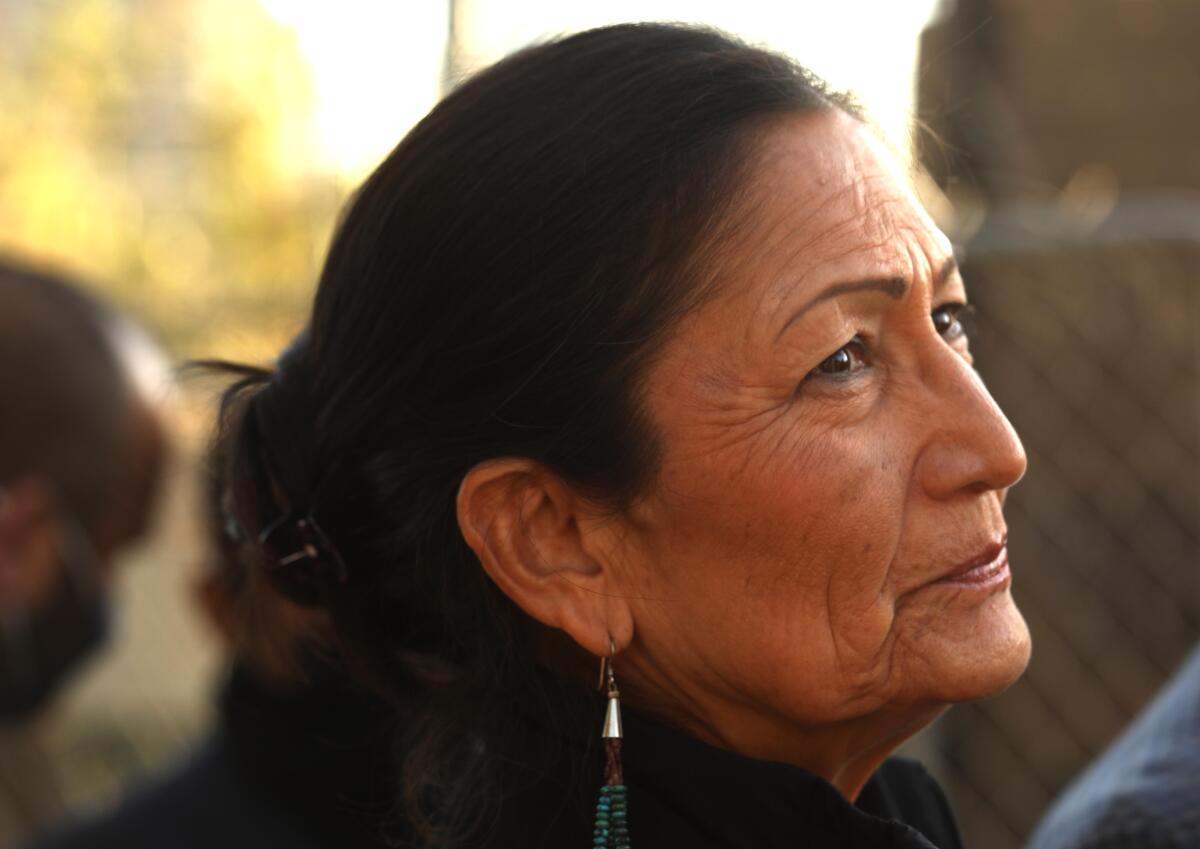Supreme Court upholds family, tribal preferences in adopting Native American children

- Share via
WASHINGTON — The Supreme Court on Thursday upheld the landmark federal adoption law that seeks to keep Native American children with tribal families.
By a 7-2 vote, the justices rejected a constitutional challenge from a white Texas couple and Texas state attorneys, who contended the federal law interfered with state adoption policies and gave preferences to tribal families that amounted to unconstitutional discrimination based on race.
“The bottom line is that we reject all of petitioners’ challenges to the statute, some on the merits and others for lack of standing,” Justice Amy Coney Barrett said for the court.
Conservative Justices Clarence Thomas and Samuel A. Alito Jr. dissented.
The law was defended by Interior Secretary Deb Haaland, the first Native American to serve at the Cabinet level.
Congress passed the Indian Child Welfare Act in 1978 after it found “an alarmingly high percentage of Indian families [were being] broken up by the removal, often unwarranted, of their children from them.” These children were being raised by non-Native families or in boarding schools.
The law gives tribal officials a role in arranging adoptions and calls for placing Native children with members of their extended family whenever possible. Members of their tribe are next in line for preference, followed by members of another tribe, before they can be considered for placement with non-Native families.
Tribal leaders described the law as the “gold standard in child welfare” and hailed Thursday’s ruling upholding it.
“Today’s decision is a major victory for Native tribes, children, and the future of our culture and heritage. It is also a broad affirmation of the rule of law, and of the basic constitutional principles surrounding relationships between Congress and tribal nations,” said Cherokee Nation Principal Chief Chuck Hoskin Jr., speaking for other tribal leaders.
Haaland called the decision “a welcome affirmation” of the 1978 law, which followed an era when federal policies had “promoted the removal of Indian children from their families” and “inflicted trauma on children, families and communities that people continue to feel today.”
It was the second time in two weeks that the conservative-majority court had upheld an act of Congress against a Republican-led state’s challenge involving race.
Last week, the justices upheld part of the Voting Rights Act that requires Alabama’s GOP-dominated Legislature to draw a new election district that might elect a Black candidate to Congress.
Thursday’s decision rejected the claim by Texas, another Republican-led state, that Congress could not interfere with state adoption proceedings by seeking to place Native American children with tribal families.
Justice Neil M. Gorsuch, a conservative who champions Native American rights and has voted with the court’s liberals on tribal issues, wrote a 38-page concurring opinion on how the 1978 law followed a century in which Native American children were taken from their families and stripped of their culture and heritage.
“Often, Native American Tribes have come to this Court seeking justice only to leave with bowed heads and empty hands,” he wrote. “But that is not because this Court has no justice to offer them. Our Constitution reserves for the Tribes a place — an enduring place — in the structure of American life.”
Thomas, who wrote a 48-page dissent on last week’s voting rights ruling, wrote a 40-page dissent on Thursday’s decision, arguing that Congress “lacked any authority” to regulate state adoptions. In a separate dissent, Alito said Congress had wrongly subordinated “the best interest of a child” to the “best interest of a tribe.”
The adoption preference for keeping Native children with tribal families had been challenged as unconstitutional by Chad and Jennifer Brackeen, a white Texas couple who had taken in two children shortly after their birth with the approval of their mother, who is Navajo. Tribal authorities later tried to remove the children from the family and send them to a Navajo couple who lived several hundred miles away.
The Brackeens sued, arguing that decisions about adoptions should be based on the “best interest of the child” and should not give an overriding preference to tribal connections.
In its decision in Haaland vs. Brackeen, the court rejected the states rights challenge to the law, saying Congress has the authority to impose adoption rules for state proceedings. The justices in the majority also said the plaintiffs did not have standing to sue over the adoption preferences.
Conservative Justice Brett M. Kavanaugh joined the majority opinion, but said such adoption preferences raise a “serious” question that remains unresolved.
More to Read
Get the L.A. Times Politics newsletter
Deeply reported insights into legislation, politics and policy from Sacramento, Washington and beyond. In your inbox twice per week.
You may occasionally receive promotional content from the Los Angeles Times.











